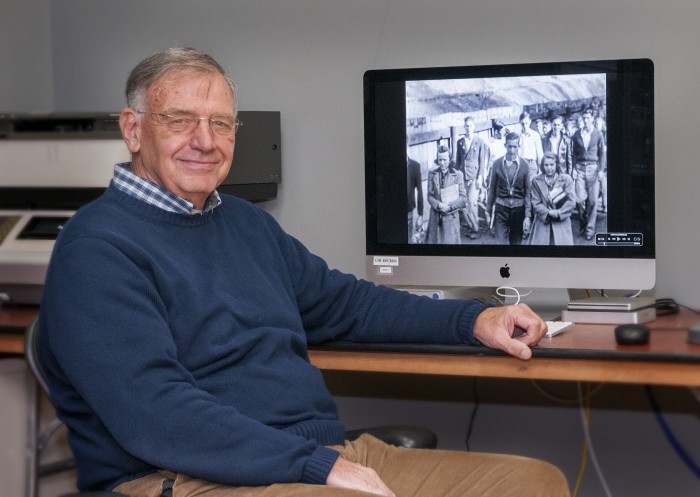By Eric Ferreri
As the grainy footage began rolling, Furman Penland, Jr., quickly recognized his mother in the crowd. That fellow walking next to her was familiar, too.
But it took Penland a beat or two to realize the young man passing quickly through the frame of this silent, 75-year-old black-and-white film was the father he’d never known.
Penland was just six months old in 1944 when his father died in the Normandy Invasion during World War II. The only child of a young widow, he grew to know his father through family stories, photos and a large stack of letters his parents wrote back and forth to each other during Furman Penland Sr.’s deployment.
That was it until a few months ago, when an email from an old friend directed Penland, now 71, to a Duke University Libraries website housing digitized movies of rural folk in places like Dante, the coal-mining town in southwestern Virginia where he grew up.
In one section of a twelve-minute reel from Dante, a line of teenagers walks along a fence line, school books in hand, smiles on their faces.
“I recognized my mother and some other family members,” Penland recalls. “And my mother was walking with this guy. I kept going back and forth thinking ‘this could be my dad.’ And I’m as sure as I could be that it is. It was shocking.”
The Dante film was one of 252 “Movies of Local People” produced by filmmaker H. Lee Waters between 1936 and 1942 in small towns across North Carolina, South Carolina, Tennessee and Virginia. Waters made a living in those years showing the films in southern movie houses.
The collection has been digitized and is now available on the Duke University Libraries website. It is searchable by town.
Since the digitized collection was released in January, the Libraries have heard over and over from people eager to reminisce about their small-town roots. Many watch the reels looking for family, friends and local landmarks.
The tone of comments on these films is unusually specific and sentimental, says Molly Bragg, Digital Collections Program Manager.
A viewer of the Fuquay-Varina film, for example, points out her husband’s aunt Sophia and makes note of the local gas station, Clark-Phelps Service & Fuel. On the Henderson, North Carolina reel, another viewer remembers that one local school back then had three sets of twins as drum majors.
“We get comments all the time on our collections, but the reaction we see from the Waters collection is far more personal,” Bragg says. “It elicits a passion from people that we don’t really see from other collections.”
In the 1940 Dante film, the teenage Penland walks alongside Nancy Townes, the woman he’d later marry. He wears an open-collar shirt under a light, buttoned cardigan sweater. He totes a couple of schoolbooks at his waist. Nancy walks alongside, warmed by a floor-length coat, a scarf around her neck, school books tucked tightly against her. Like many of the youngsters in this movie, she sneaks a coy peek at the camera as she passes beneath it. He appears to as well.

They come and go in a four-second blip right at the film’s two-minute mark. Where were they going? What were they talking about? Had they any idea, at that moment, that they’d fall in love, have a son and suffer tragedy in a war overseas?
Nancy Townes Penland never remarried. She worked as a factory worker and school teacher in and around Dante and died in 1997.
Penland Jr. went to Eastern Kentucky University on a football scholarship and later became a psychologist. He worked for many years at Wake Forest University before moving to Asheville to head the local Area Health Education Centers branch there, a medical outreach program under the University of North Carolina umbrella. He and his wife are now retired and still live in Asheville.
“It’s real. It’s just three or four seconds, but these are very meaningful seconds I never expected to have.”
His has been a life in full, and yet this brief clip of black-and-white film recorded four years before he was born has helped fill in some gaps in his life. The story of where he comes from now seems more tangible.
“These were two live people who would try to make a life together at a time of poverty and war,” he says now. “It’s real. It’s just three or four seconds, but these are very meaningful seconds I never expected to have. I’m 71 years old now. It took me that long to see my dad.”
Eric Ferreri is a senior writer with Duke’s Office of News and Communications. A previous version of this story originally appeared online on DukeToday.

